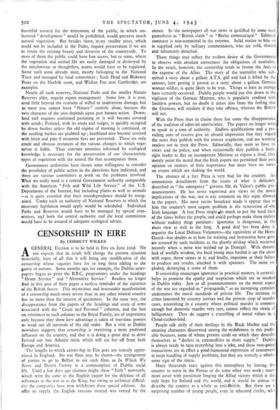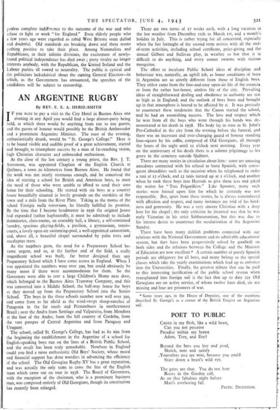CENSORSHIP IN EIRE
By COBBETT WILKES
AGENERAL Election is to be held in Eire on June 22nd. No one expects that its result will change the present situation materially, least of all that it will bring any modification of the censorship whose vagaries have for so long been adding to the gaiety of nations. Some months ago, for example, the Dublin news- papers began to print the B.B.C. programmes under the headings "Home Service " and " Alternative Service." Readers no longer _ find in this part of their paper a tactless reminder of the existence of the British forces. This mysterious and inscrutable manifestation of a censorship much more severe than in any other neutral country has no more than the interest of quaintness. In the same way, the disappearance from the papers of the headings and coats of arms associated with the " Court and Personal " columns, and the ban on references in such columns to the Royal Family, are of importance only because they show how advantage is taken of war-time powers to weed out all survivals of the old order. But a visit to Dublin nowadays suggests that censorship is exercising a most profound influence on the country, and that it is doing a great deal to drive Ireland out into Atlantic mists which will cut her off from both Europe and America.
The lengths to which censorship in Eire goes are scarcely appre- ciated in England. No war films may be shown—the arrangement of parties to go to Belfast to 4e such films as In Which We Serve and Desert Victory is a commonplace of Dublin social life. Until a few days. ago cinemas might show " Irish " newsreels, which were the same as the English except for the deletion of all references to the war or to the King, but owing to technical difficul- ties the companies have now withdrawn these special editions. An offer to supply the English versions instead was vetoed by the
censor. In the newspapers all war news is qualified by some such parenthesis as " British claim " or " Berlin communique!' Editorial comment is non-committal. in the extreme. Solid matter to bite on is supplied only by military commentators, who are cold, shrewd and inhumanly detached.
These things may reflect the evident desire of the Government to observe with absolute correctness the obligations of neutrality. In the result, howiver, the censorship tends to favour the Axis at the expense of the Allies. The story of the journalist- who sub- mitted a story about a gallant A.T.S. girl and had it killed by the censors, later getting it passed as a story about a gallant German woman soldier, is quite likely to be true. Things at least as strange have certainly occurred. Dublin people would put this down to the vigilance of the German Minister, who is popularly credited with limitless powers, but no doubt it arises also from the feeling that the Germans will retaliate if they take offence, whereas the British will not.
With the Press thus in chains there has come the disappearance of the tradition of editorial omniscience. The papers no longer seem to speak in a tone of authority. Endless qualifications and a pre- vailing note of reserve give an absurd impression that they regard the news they publish with the utmost scepticism, and are warning readers not to trust the Press. Editorially, they seem to have no views and no policy, and when occasionally they publish a forth- right leader to flay an incompetent Minister or expose a rival', they merely point the moral that the Irish papers are permitted their own opinion on matters of little importance but must have no views on events which are shaking the world.
The absence of a fret Press is very bad for the country. An ostentatious detachment from the issues of what is delicately described as " the emergency " governs Mr. de Valera's public pro- nouncements. He has never expressed any views on the moral implications of the war, nor is any comment on this topic allowed in the papers. His most recent broadcast made it appear that to him the country's most urgent problem is the restoration of -the Irish language. A free Press might to much to put the hard facts of the times before the people, and could perhaps make them realists without making them partisans: ignorance is dangerous, in the short view as well as the long. A good deal has been done to organise the Local Defence Volunteers—the equivalent of the Home Guard—but doubts as to how far training and instruction have gone are aroused by such incidents as the ghastly mishap which occurred recently when a mine was washed up in Donegal. With dreamy lack of worldly wisdom, the local young men hauled it up the shore with ropes, threw stones at it, and finally, impatient at their failure to produce any results, attacked it with spanners. The mine ex- ploded, destroying a score of them.
If censorship encourages ignorance in practical matters, it certainly helps to promote the apathy and scepticism which are so marked in Dublin today. Just as all pronouncements on the moral aspect of the war are regarded as " propaganda," so an increasing cynicism undermines the moral standards of private life. The increase in crime lamented by country justices and the present crop of murder cases, astonishing in a country where political murder is common enough but domestic murder very rare, cannot reflect the strain of belligerency. They do suggest a crumbling of moral values in a Cloud-cuckoo-land.
People talk airily of their dealings in the Black Market and the amusing characters discovered among the middlemen in this profit- able business, some of whom present cards on which they describe themselves as " dealers in commodities in short supply." Dublin is always ready to turn everything into a joke, and these easy-going transactions are in effect a good-humoured expression of resentment at inept handling of supply problems, but they are scarcely a whole- some sign of the times.
Many thousands react against this atmosphere by leaving the country to serve in the Forces or do some other war work ; many more' await with passionate longing the Allied victory which is the only hope for Ireland and the world, and it would be untrue to describe the country as a whole as anti-British. But there are a surprising number of young people, even in educated circles, who profess complete indifference to the outcome of the war and who refuse to fight or work " for England." Even elderly people who a few years ago were regarded as rabid West Britons seem dulled and doubtful. Old standards are breaking down and there seems nothing positive to take their place. Among Nationalists and Republicans, in their infinite divisions, the excitement of newly- found political independence has died away ; party rivalry no longer interests anybody, with the Republican, the United Ireland and the Labour parties all vowed to neutrality. The public is cynical and the politicians lackadaisical about the coming General Election—in which, as the Government has announced, the speeches of the candidates will be subject to censorship.



























 Previous page
Previous page